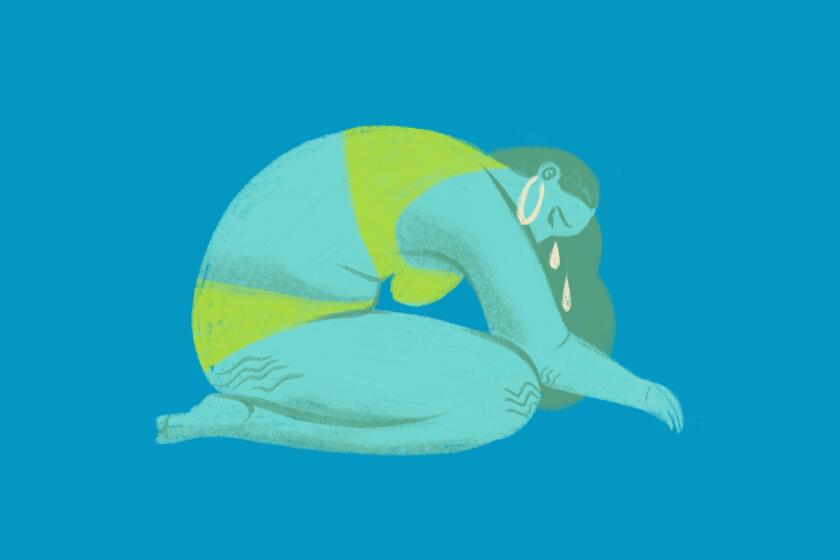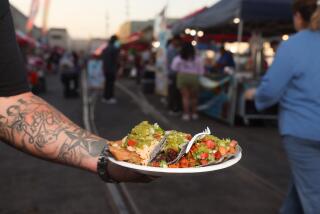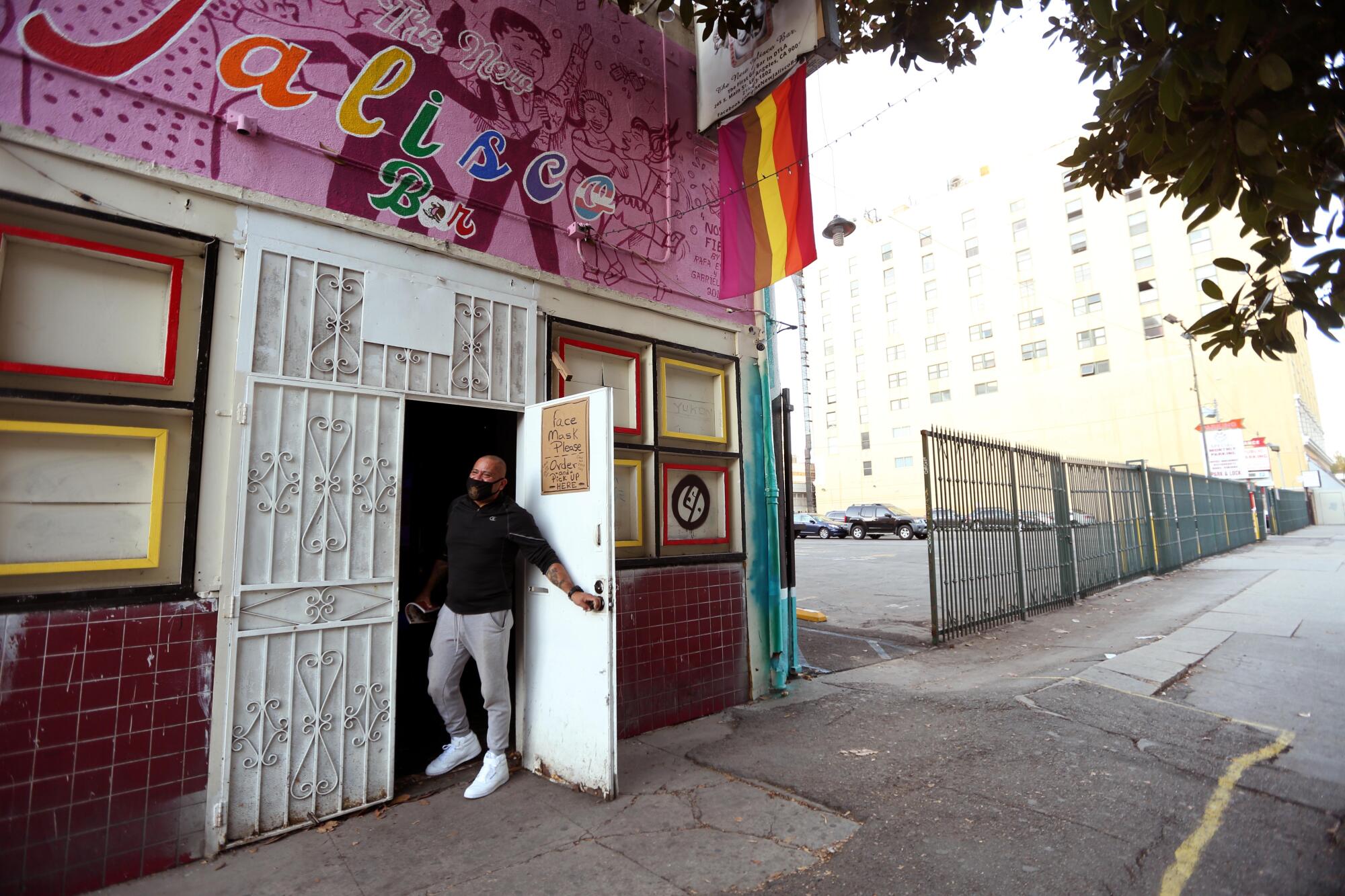
Gay bars survived the AIDS crisis, oppression and recessions, but the pandemic is driving bars out of business nationwide, especially those catering to people of color.
- Share via
The nightly drag shows were advertised in dramatically stylized Spanish-language Facebook fliers. “Maritza and Her Divas” performed on Wednesdays. “Chantal and Her Dolls” had Fridays. And Yesenia Gaitan’s Saturday “Taboo Nights” was billed as the best musical show in downtown Los Angeles.
The New Jalisco Bar welcomed people in just as they were — homosexuales, transgeneros, sin papeles, dressed as vaqueros and old enough to feel out of place dancing to house music in West Hollywood.
It was a respite for the marginalized of the marginalized, even in a city dominated by Latinos, with one of the country’s most burgeoning LGBTQ scenes, where you might think more than a handful of bars would cater to people in both categories. It was a place for queer Latinos to feel seen every night of the week.
“Jalisco to me feels like going to, like, a family quinceañera,” said Gabriela Ruiz, 29, a queer performance artist. “Everyone there is like your gay uncle.”
But that was before the COVID-19 pandemic. It’s been closed for almost a year, while other LGBTQ spaces throughout the city and country have shuttered for good: Cuties in East Hollywood — L.A.’s only queer-focused coffee shop; Rage nightclub in West Hollywood; San Francisco’s oldest gay bar, The Stud; Little Jim’s, the second-oldest gay bar in Chicago.
The decline of gay bars started well before the pandemic, in part because increased acceptance of queer people has lessened the need for bars as places of refuge.
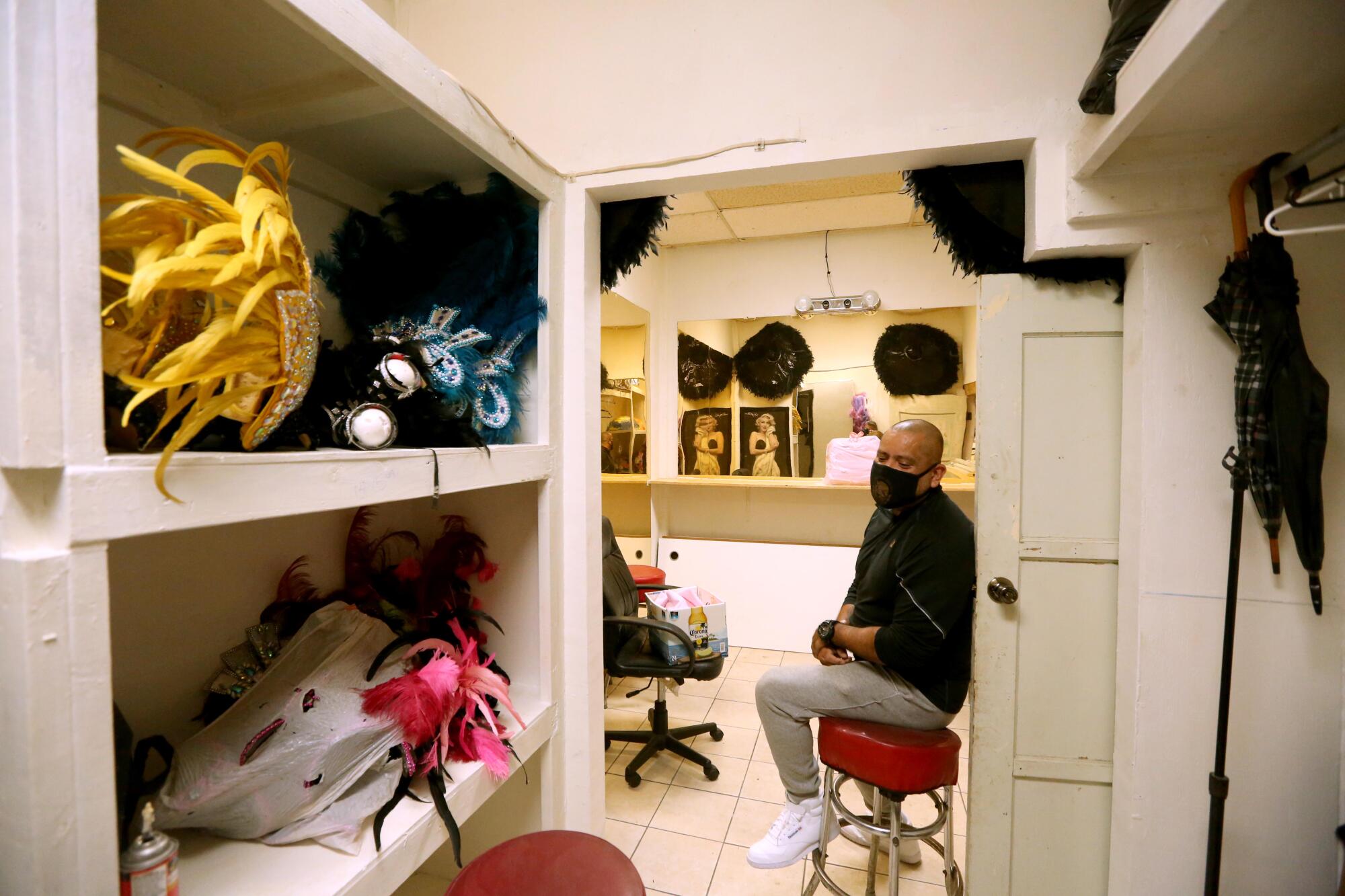
As many as 37% of LGBTQ bars shut down between 2007 and 2019, according to a study by Greggor Mattson, a sociology professor at Oberlin College in Ohio. The trend is even starker among bars serving people of color, with nearly 60% having closed by 2019.
Mattson said bars serving working-class queer people are more likely to be pushed out by gentrification than those catering to middle-class and white gay men, he said.
Historically, transgender and nonwhite people were unwelcome in many gay bars that served white men, Mattson said.
“The irony is that just as gay bars have become more inclusive, they’re starting to go away,” he said.
A time capsule of L.A.’s bar history is now on display at downtown’s Central Library.
The owners of Jalisco are struggling to ensure their closure isn’t permanent.
Maria Rosa Garcia, 53, started as a bartender there in 1992. It was her first job in L.A. a few months after immigrating from Mexico City as a 24-year-old with her two daughters.
Jalisco sits off Main and 2nd Street, across from the Vibiana, an arts center. Back then it was a billiards bar called Jalisco Inn. Garcia, outgoing and friendly, often threw back a beer or two with patrons as they exchanged stories and jokes.
At the time, there was only one gay bar downtown: The Score. So when a few gay men started coming in, she welcomed them.
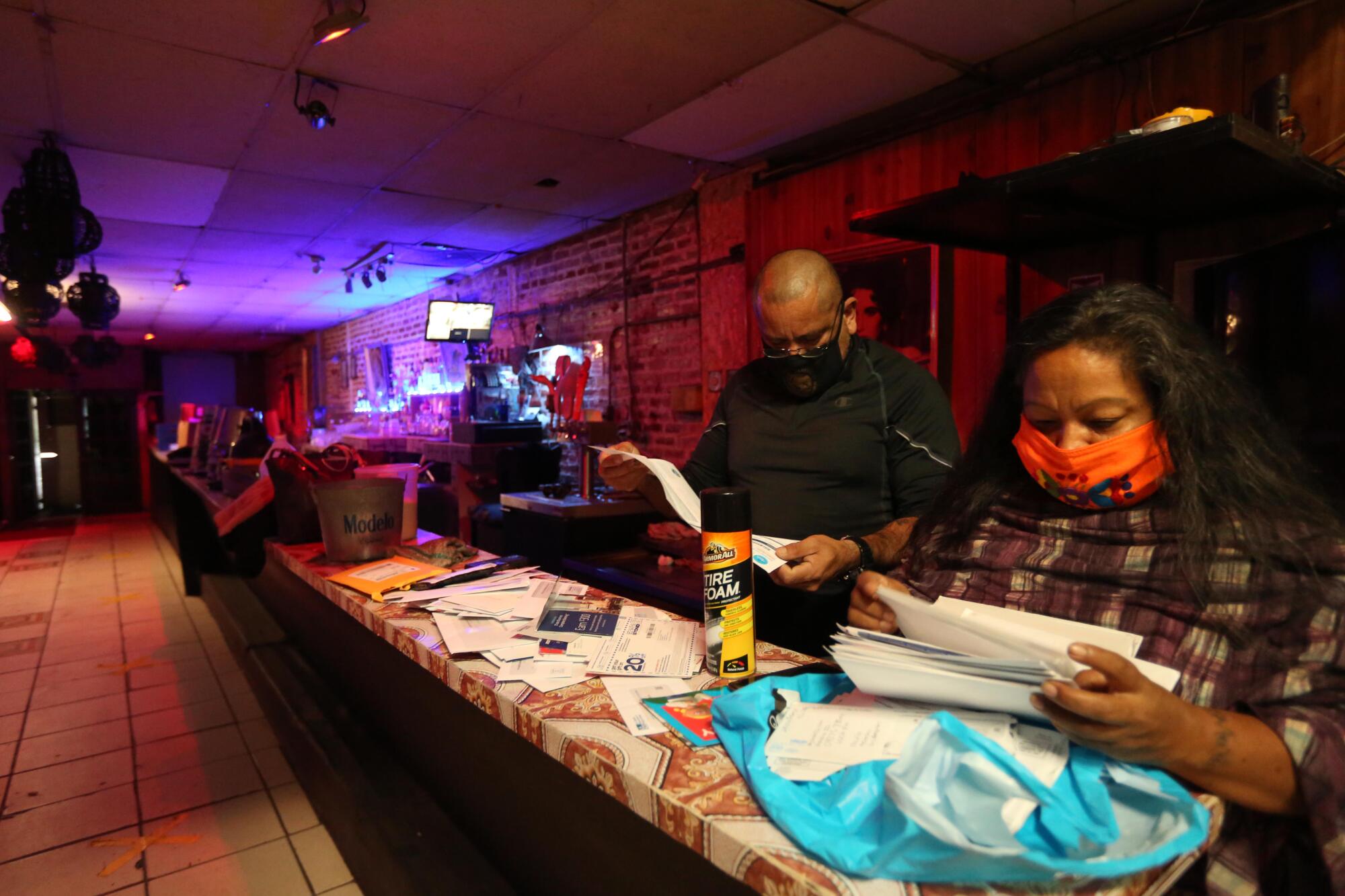
As the owner got older, he left Garcia to manage the bar by herself. When he died in 2005, Jalisco became hers officially. By then she had married Sergio Hernandez, who left his job as another bar’s security guard to help Garcia at Jalisco.
Los Angeles in the 1990s was racially and politically tense. California voters had approved Proposition 187, which sought to deny undocumented immigrants access to services, including public healthcare and education. Then-President Clinton unveiled the “Don’t ask, don’t tell” policy, which prevented service members from being openly gay, lesbian or bisexual without the threat of being discharged. And the prevalence of AIDS among Latinos nationwide skyrocketed by 130% between 1993 and 2001.
At Jalisco, some patrons unaccustomed to seeing same-sex couples turned aggressive toward the new customers. After The Score closed in the early 2000s, LGBTQ patrons urged Garcia to dedicate her space to the community she had so openly accepted.
“We have to recognize that this is a gay bar,” Hernandez told his wife. So they hung a rainbow flag outside. After that, the number of straight patrons decreased while LGBTQ patrons increased.
Shunned or unwelcome elsewhere in less tolerant times, queer people could gather in bars, which for generations served as the community’s public squares and remain hubs for organizing and fundraising.
“Even still, in this era where we can find queer content on YouTube and find sex partners or romance on phone apps, if you want to be in a room with other queer people, bars are often the only option,” Mattson said. “That’s something that straight people don’t often have to think about. Every queer person can tell you the first time they went to a gay bar. It’s still a rite of passage.”
Mattson is sure the bars won’t entirely disappear.
“Gay bars have survived political oppression, the AIDS crisis, previous recessions, so they will survive this pandemic,” he said. “But there is something special lost when a bar of 30 years goes under, because it takes with it a local history and a staff that knows people’s names.”
In recent years, roaming circuit parties have become popular among queer youth. And more bars that cater to the broader LGBTQ community, including Micky’s in West Hollywood, dedicate certain nights of the week to Latinos and other ethnic groups.
But just as there’s no substitute for a queer bar, there’s no substitute for those catering to Latinos, says Eddy Francisco Alvarez Jr., an assistant professor of Chicana and Chicano studies at Cal State Fullerton whose research includes queer Latinx history.
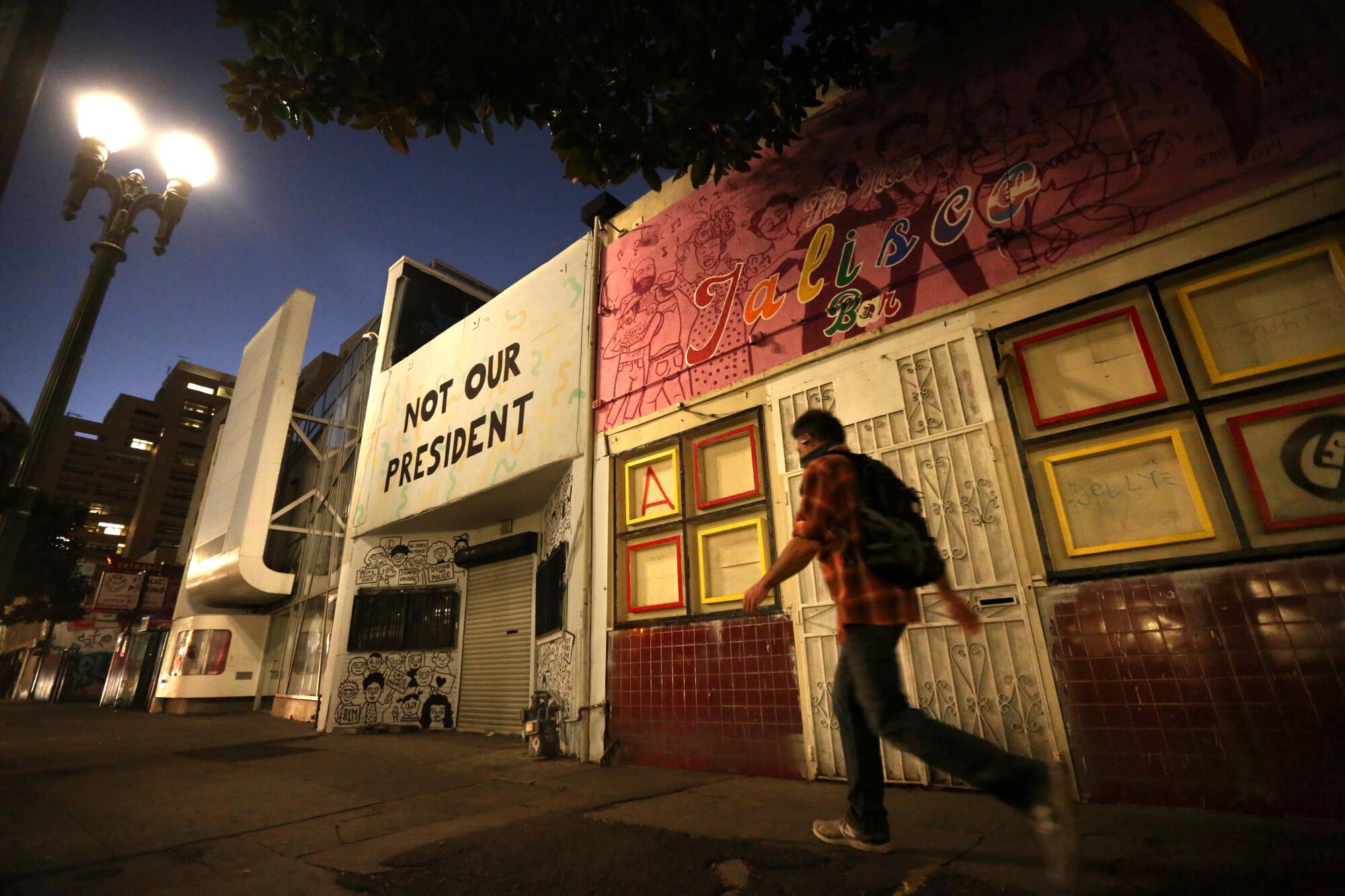
What the community needs, he said, are more “jotería spaces” — places where queer Latinos “don’t have to compartmentalize different parts of who we are,” he said. “We can show up and be Latino, Chicano, immigrant, Afro-Latino, femme and trans — all of those intersecting identities — and just be who we want to be. And be messy.”
Above the entrance to Jalisco, a mural depicts people dancing against a lavender background — two women, two cowboys, singers Celia Cruz and Juan Gabriel, as well as Ignacio “Nacho” Nava Jr., a local queer nightlife icon who died in 2019.
Ruiz, the performance artist, painted the mural along with the artist Rafa Esparza. They took inspiration from a Mexican newspaper illustration from 1901 called “The Dance of the 41,” based on a scandal in which police raided a dance attended by men, some of whom were wearing dresses.
Nightlife spaces are often trivialized, Alvarez said, but they are places not only of diversion and celebration, but also where sorrow can be shared and hardships eased. During the AIDS crisis, showing up at the club meant you had survived, he said.
“We can’t do that now,” he said. “We can’t go to the club and grieve out the loss of our loved ones dying from this pandemic. There’s that conundrum of not being able to congregate and be with each other, bailando.”
Drag bars, rock shows and performance artists. How the L.A. artist captured the subcultures of ’90s L.A.
At Jalisco, among the many economic casualties of the pandemic is Vanessa Antonely, a drag performer who specialized in lip syncing as Adele and Amanda Miguel.
Antonely, 44, had hustled between Jalisco, another job charging entry at Club Cobra in North Hollywood and side gigs as a makeup artist. She had quinceañeras and weddings lined up for all of 2020. Then everything ground to a halt. Cobra, which also catered to LGBTQ Latinos, closed in May.
Recently, she started assisting her partner in running a mobile dog grooming business.
Antonely had always been an optimist; the lighthearted, funny friend in the group. But as she watched her $13,000 in savings dwindle to zero, knowing she lacked the legal status necessary to qualify for unemployment and other benefits, she fell into a deep depression.
“When you are trans, people think you’ll either cut hair or become a prostitute,” she said. “They limit you to that.” But she had always wanted to perform. Working at LGBTQ spaces was a lifeline.
In the U.S. and Latin America, the COVID-19 pandemic is affecting the mental health of LGBTQ young people. Experts give tips on navigating the crisis.
Jalisco had 20 employees — Garcia, Hernandez and three bartenders, plus the drag performers and DJs, who were gig workers. Most of them are trans and around half without papers.
Every employee was left jobless on March 16, the day that Los Angeles County officials mandated the closure of bars and gyms.
Garcia and Hernandez took advantage of the initial closure and invested their $10,000 savings in renovations, retiling and upgrading the old plumbing in the women’s bathroom, and creating a dressing room so drag performers wouldn’t have to get ready in a small storage closet. Hangers were placed on a clothing rack tall enough to keep gowns off the floor.
But the grand reopening never came. Instead, Garcia and Hernandez visited their beloved bar once a week to check the mail, holding their breath each time for bills.
“Gay bars have survived political oppression, the AIDS crisis, previous recessions, so they will survive this pandemic.”
— Greggor Mattson, Oberlin College sociology professor
Inside, the exposed brick walls are decorated with portraits of Marilyn Monroe and Elizabeth Taylor. A small sign behind the long bar, easy to miss in the dark glow lighting, depicts a woman in a sombrero pointing two guns.
“Yo nací cabrona porque pendejas ya había muchas,” it reads. I was born a badass because there were already too many idiots.
Yellow duct tape Xs on the tile floor mark where tables would have gone when indoor service briefly resumed in June. But before Garcia and Hernandez could follow through, Gov. Gavin Newsom ordered bars in Los Angeles to close again as COVID-19 cases escalated.
On a recent visit, Hernandez opened up a metal cooler and removed a bottle of Miller Lite. He put on his glasses to read the small, gold-stamped expiration date: Aug. 3, 2020.
They owe $55,000 in rent alone. Almost $5,000 in beer and other alcohol has expired and must be tossed.
Standing behind the bar, with dozens of envelopes stacked on the counter in front of her, Garcia picked up a bill from the Los Angeles Department of Water and Power and ripped the seal. The total: $5,954.42.
Garcia and Hernandez know intimately the struggles of Antonely and the other undocumented workers. Because they, too, lack legal status, they’ve been ineligible for the small-business loans and other COVID-related federal government relief.
Instead, Hernandez took a job at a moving company and Garcia has taken to slinging tacos and quesadillas in front of their South L.A. home.
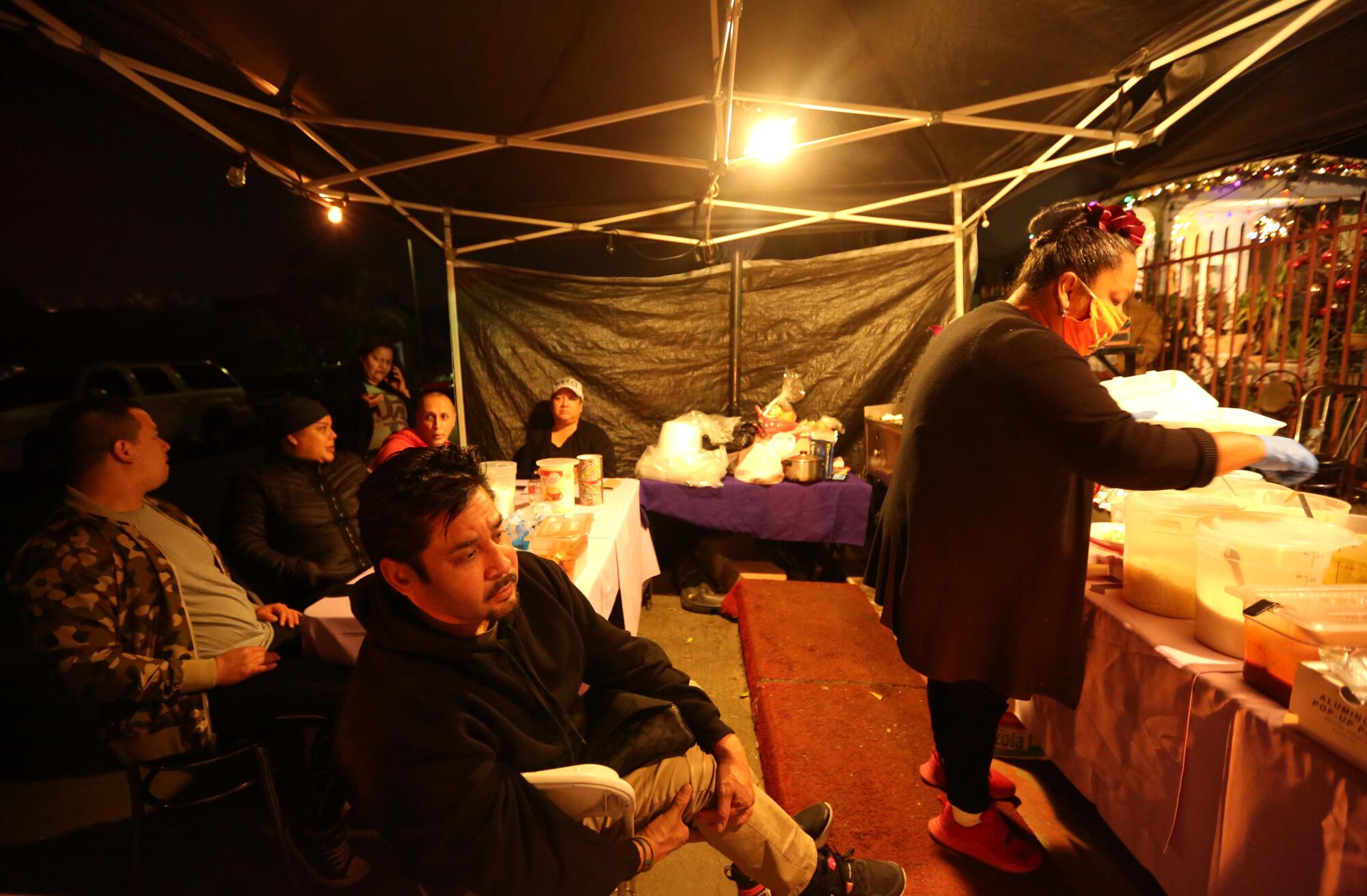
Just before Christmas, Ruiz reached out to see how they were doing. Saddened by the thought that Jalisco could close for good, she helped them create an online fundraiser. It is now past halfway to the $80,000 goal.
Donors shared memories and gratitude.
“The New Jalisco has been there for me when I needed a queer space to feel safe,” one person wrote.
Jalisco “is a community space as much as it is a bar,” said another.
While significant, the amount raised points to the socioeconomic gap between patrons of Jalisco and places such as the Silver Lake mainstay Akbar, which was on the verge of closing before its owners raised $230,000 in donations.
If Jalisco survives the pandemic, Garcia and Hernandez will still have the gentrification of their neighborhood to contend with. Garcia said they pay half the rent of some of their new neighbors.
On a Thursday night last month, Garcia stood before a grill set up under a canopy on the dark street in front of her house. A small LED sign in one corner flashed “tacos.”
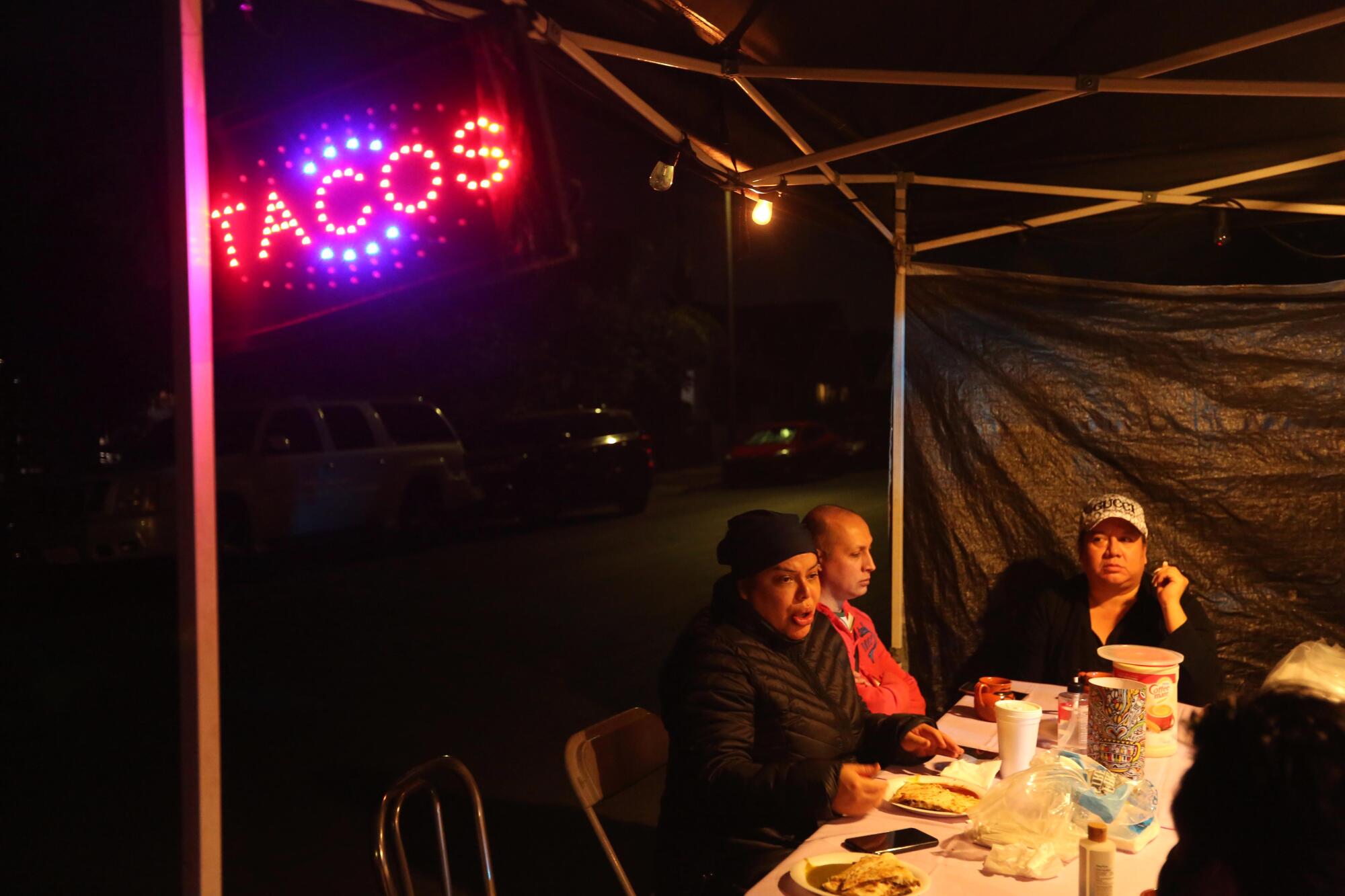
She squeezed fresh tortillas on a wooden press. A deep fryer made a hollow crackling noise as quesadillas cooked.
Antonely, the drag dancer, soon pulled up with other Jalisco workers: Marco Ortiz, known for impressions of Juan Gabriel and Vicente Fernández; Lluvia Guzman, who directed the shows and performed as Jenni Rivera; and Chantal Fernandez, who imitated Cher and Katy Perry.
The group said they had become closer friends during the pandemic. Despite their own struggles with joblessness, they reunited a few times a week for dinner at Garcia’s. She had given them work, they reasoned, so now it was their turn to support her.
Garcia set mugs of hot café de olla and plates of buttered bolillos on the table for her friends.
“No te preocupes, Rosita,” Antonely told her. Don’t worry. We will all go back to work at Jalisco.
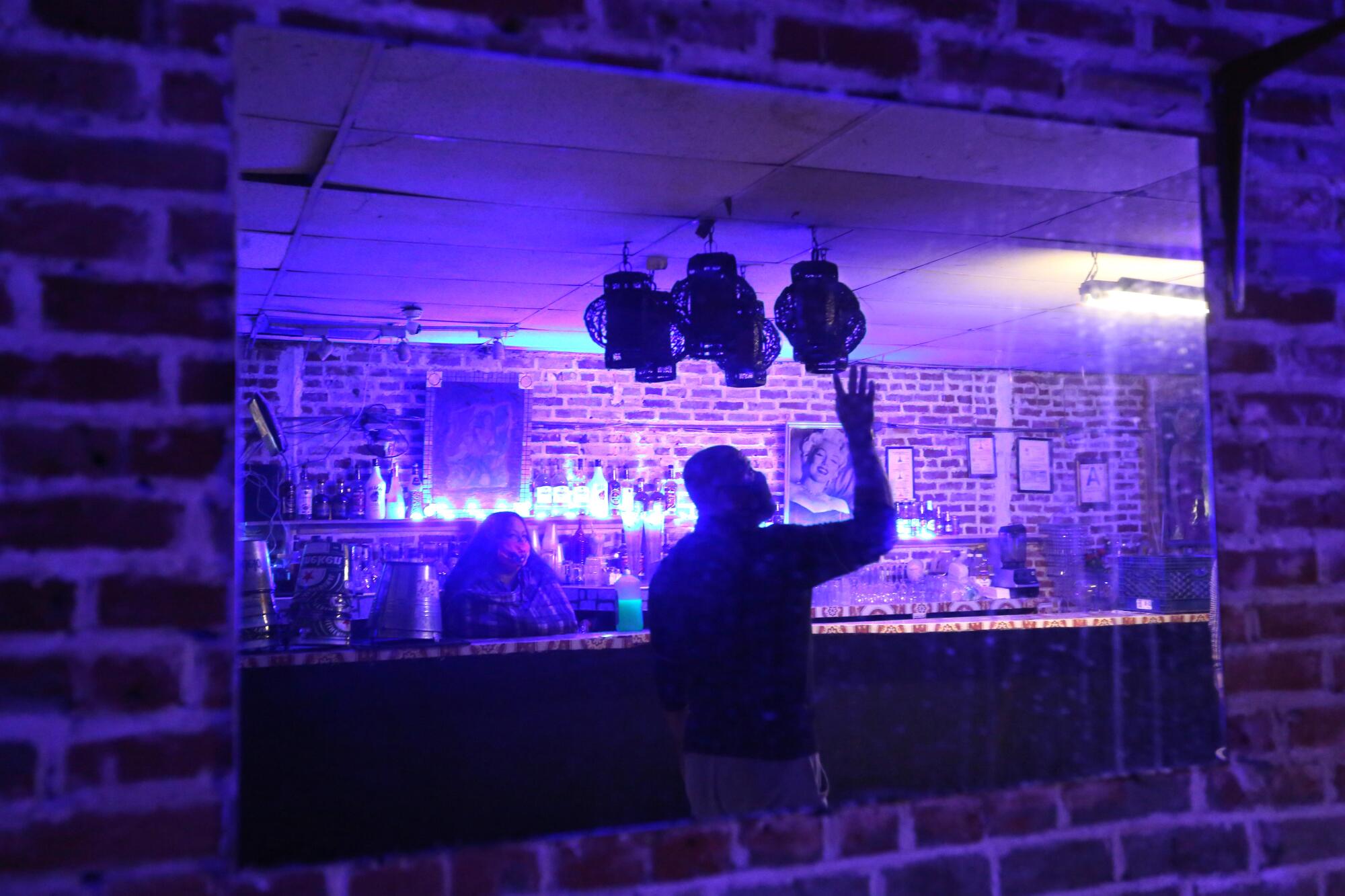
More to Read
Sign up for Essential California
The most important California stories and recommendations in your inbox every morning.
You may occasionally receive promotional content from the Los Angeles Times.
